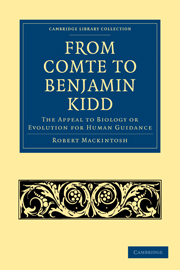Book contents
- Frontmatter
- PREFACE
- Contents
- CHAPTER I INTRODUCTORY
- PART I COMTISM, WITH SOME SCATTERED PARALLELS
- CHAPTER II COMTE'S LIFE AND THE PRINCIPLES OF HIS TEACHING
- CHAPTER III THE APPEAL TO BIOLOGY
- CHAPTER IV THE APPEAL TO HISTORY
- CHAPTER V THE DOCTRINE OF ALTRUISM
- CHAPTER VI COMTE'S LAWGIVING
- PART II SIMPLE EVOLUTIONISM—SPENCER, STEPHEN
- PART III DARWINISM, OR STRUGGLE FOR EXISTENCE
- PART IV HYPER-DARWINISM—WEISMANN, KIDD
- Index
CHAPTER II - COMTE'S LIFE AND THE PRINCIPLES OF HIS TEACHING
Published online by Cambridge University Press: 29 August 2010
- Frontmatter
- PREFACE
- Contents
- CHAPTER I INTRODUCTORY
- PART I COMTISM, WITH SOME SCATTERED PARALLELS
- CHAPTER II COMTE'S LIFE AND THE PRINCIPLES OF HIS TEACHING
- CHAPTER III THE APPEAL TO BIOLOGY
- CHAPTER IV THE APPEAL TO HISTORY
- CHAPTER V THE DOCTRINE OF ALTRUISM
- CHAPTER VI COMTE'S LAWGIVING
- PART II SIMPLE EVOLUTIONISM—SPENCER, STEPHEN
- PART III DARWINISM, OR STRUGGLE FOR EXISTENCE
- PART IV HYPER-DARWINISM—WEISMANN, KIDD
- Index
Summary
Alone perhaps of all sociologists, Comte may claim to have his life studied, however briefly, as an integral part of the gospel he teaches.
Auguste Comte was born at Montpellier in 1798. He was early distinguished for his mathematical ability ; also for a refractoriness to authority, which led to his expulsion from the Polytechnic School of Paris. In 1818 he met St. Simon the socialist, and became for six years his close friend and disciple; but the alliance was broken off by a violent quarrel, never to be healed. In 1825 he married. The union proved conspicuously unhappy, and ended in a separation in 1842. In 1826 he began lectures upon his system of philosophy; and though they were interrupted for a time by an attack of insanity, the lectures attracted great attention. Between 1830 and 1842 they were published in six volumes under the title of System of Positive Philosophy. While working for fame or usefulness by developing his system, Comte worked for bread and butter by the exercise of his mathematical talent, mainly in the service of that Polytechnic School from which he had been expelled in his student days. His eminence as a heresiarch cost him his connection with the school; and thereafter he lived by his earnings as a private tutor, or by the gifts of his devoted disciples.
- Type
- Chapter
- Information
- From Comte to Benjamin KiddThe Appeal to Biology or Evolution for Human Guidance, pp. 9 - 24Publisher: Cambridge University PressPrint publication year: 2009First published in: 1899

